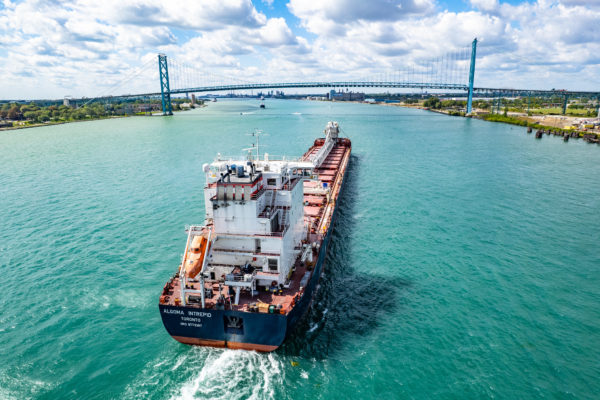US Great Lakes shipping activity continues to be on par with the previous year, as approximately 15.7 million tonnes of total cargo traffic traveled the seaway system for the year to date.
Two key steel making commodities continue to show strong traffic volumes, with more than 3 million metric tonnes of iron ore moving through the system thus far (a year over year increase of 351,000 tonnes), and more than 1 million tonnes of coal transiting the system (a year over year increase of 248,000 tonnes).
In addition, cement and stone showed increases over the prior year’s traffic, with 900,000 tonnes of cement transiting the system (an increase of 80,000 tonnes) and 146,000 tonnes of stone traveling through the system (an increase of 69,000 tonnes, or almost 90%).
The Port of Duluth-Superior is one of the key ports managing much of this traffic, having recently handled the most iron ore from Duluth-Superior in a single month since May 1993. Several other bulk cargoes also posted summer gains through North America’s furthest-inland seaport, including salt (up 13.2% YOY), limestone (up 5.9% YOY) and cement (more than double the 2022 pace).

“It’s definitely been a good first half for many of the bulk cargoes that move through our port, led of course by our king cargo, iron ore,” said Deb DeLuca, executive director of the Duluth Seaway Port Authority. “We’re seeing the effects of steady manufacturing and construction activity throughout the Great Lakes region, which helps drives demand, and also an increase in exported iron ore, which was up more than 26% over last year’s pace through July.”
In addition to a brisk pace of cargo movement through the port (11% ahead of last year’s pace through July 31), Duluth is also progressing on construction of a new 56,000-square-foot dockside warehouse at the Clure Public Marine Terminal. This project is expected to reach completion by the end of August, increasing Duluth Cargo Connect’s total warehousing capacity over 500,000 square feet.
The developments taking place in Duluth are representative of a vibrant North American maritime shipping industry that plays a central role in supporting economic strength. Per the recently released economic study “Economic Impacts of Maritime Shipping in the Great Lakes – St. Lawrence Region” by Martin Associates, shipping on the Great Lakes St. Lawrence Seaway supported:
- $36 billion (USD) in economic activity;
- more than 240,000 jobs that generated more than $17.8 billion (USD) in wages;
- the movement of 135.7 million metric tons of raw materials and finished goods; and
- $6.3 billion (USD) in taxes.
“The exciting developments taking place at ports like Duluth and the statistics shown in the independent Martin economy study are all evidence of why marine shipping remains the strongest, most significant, and most sustainable link in the North American supply chain,” said Bruce Burrows, President and CEO of the Chamber of Marine Commerce (CMC). “The current mix of visionary research and development activity and service expansion by CMC members, coupled with unprecedented engagement and support by federal, provincial, and state governments, is setting the stage for a stronger and greener supply chain that will benefit business and consumers for generations to come.”











